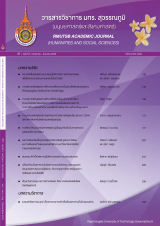เปรียบเทียบปัญหาความรับผิดทางอาญาในลักษณะ hate speech ต่อบุคคลสาธารณะทางสื่อสังคม: ศึกษากฎหมายไทย สหรัฐอเมริกา นิวซีแลนด์ และอินโดนีเซีย
Main Article Content
Abstract
ส่วนการศึกษาการบังคับใช้กฎหมายของไทย พบว่า ยังไม่มีการบัญญัติลักษณะการกระทำ hate speech เป็นความผิดครอบคลุมบุคคลหรือกลุ่มบุคคลที่สร้างความเกลียดชังทางความคิดและส่งผลเสียหายจนนำไปสู่การก่ออาชญากรรมต่อบุคคลสาธารณะ ทำให้ต้องปรับใช้ตามกฎหมายที่มีอยู่ซึ่งมีข้อจำกัดของบทลงโทษและส่งผลกระทบต่อผู้ให้บริการสื่อสังคมตลอดจนขอบเขตแห่งสิทธิของบุคคลสาธารณะที่สังคมสามารถวิพากษ์วิจารณ์รวมถึงการใช้พยานหลักฐานทางอิเล็กทรอนิกส์ในการดำเนินคดี
ผู้วิจัยมีข้อเสนอแนะ 1) กำหนดความผิดฐาน “สร้างความเกลียดชังด้วยวาจา” ในประมวลกฎหมายอาญา และข้อยกเว้นในมาตรา 329 วรรคท้ายว่า “เว้นแต่การกระทำนั้นเป็นความผิดฐานสร้างความเกลียดชังด้วยวาจาตามมาตรา.....” 2) แก้ไข พ.ร.บ. ว่าด้วยการกระทำความผิดเกี่ยวกับคอมพิวเตอร์ฯ มาตรา 14 เป็น “ผู้ให้บริการจงใจ หรือมีเจตนาร่วมกันทำ หรือรู้แล้วแต่ละเลยไม่ ดูแลป้องกัน ต้องระวางโทษเช่นเดียวกับผู้กระทำความผิดตามมาตรานี้” 3) บัญญัตินิยาม หลักเกณฑ์ วิธีการนำสืบพยานข้อมูลอิเล็กทรอนิกส์ และหลักเกณฑ์การรับฟังและชั่งน้ำหนักพยานหลักฐานประเภทนี้ในกฎหมายวิธีพิจารณาความอาญา
Comparison of the issue of criminal liability in hate speech to the public figure by the social media: on the laws of Thailand, United States of America, New Zealand and Indonesia
The comparative study of the laws of Thailand, the United States of America, New Zealand and Indonesia found that each country differently implemented the law for the crime of hate speech characteristics according to the legal system and the importance of protecting freedom of individual expression. If a comment causes other damages to someone else, it is deemed guilty of libel imposed on each country. However, if the action insults human dignity, it is enacted by each country to be guilty in the manner of creating hatred as well.
The study on enforcement of Thailand’s laws revealed the hate speech is not enacted as an offense inclusive of the individual or group in causing hatred of thought and leading to crimes against public figures. As a result, it had to be applied to the existing laws which had the limitations of sanctions and the impact of social media providers, as well as the scope of the public figure rights for the society to criticize and the use of electronic evidence in litigation.
The researcher provided suggestions as follows: 1) specify the delinquency by hate speech in the criminal code and the exception from the last paragraph of article 329 for hate speech; 2) revise the Computer Related Crime Act. B.E. 2550, article 14 for the social media providers who have intent to break or neglect the law must be responsible the same as the users; and 3) legislate definitions, rules, investigations of electronic evidence process and criteria of admitting and weighting the electronic evidence in the procedure of criminal law.


